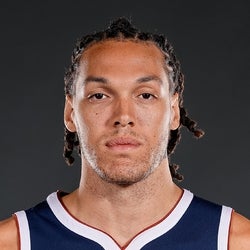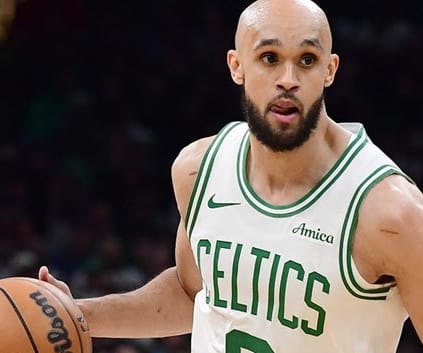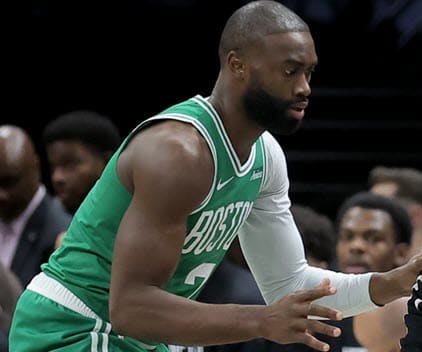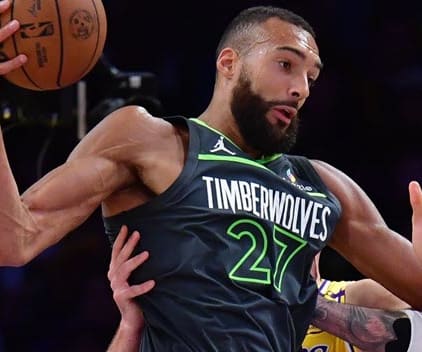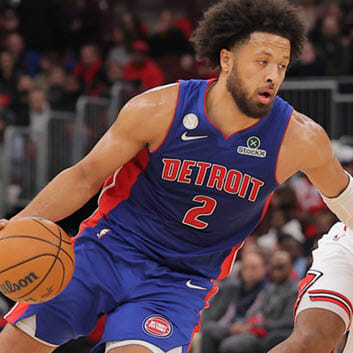Out
Injury Hamstring
Est. Return 3/6/2026
2025 Stats
PTS
17.7
REB
6.2
AST
2.5
STL
0.7
BLK
0.2
ROS Projections
2025 Fantasy Outlook
A persistent calf injury diminished Gordon's 2024-25 campaign. He appeared in just 51 games and saw 28.4 minutes per contest. However, there were positives to take away. It was the most efficient season of the forward's career, with a career-high 65.0 true shooting percentage. That was buoyed by career marks in both three-point percentage (43.6%) and free-throw percentage (81.0%), which have both been weak points in Gordon's game. The increased three-point percentage also came with more volume, with Gordon's 1.9 makes per 36 minutes marking the second-highest rate of his career. Though Gordon's offensive development was impressive, he took a step back as a rebounder and defender. All three of his rebounds (6.1), steals (0.6) and blocks (0.3) per 36 minutes were the lowest of his career. It might be easy enough to chalk that up to in-game load management due to the calf injury, but it's also possible Gordon is taking a step back in those areas as he enters his age-30 season. Regardless, his role is safe for the upcoming season. The Nuggets retooled by trading away Michael Porter and adding Cameron Johnson, Bruce Brown, Tim Hardaway and Jonas Valanciunas - none of those players should threaten Gordon for minutes. In fantasy, Gordon is best for deeper formats. He's a solid contributor across the board, but doesn't have much upside. That's fine for filling out a bench in 14-team or 16-team leagues, but there's more potential to be had by drafting other players in standard 12-team formats. Read Past Outlooks

Eyeing return Friday
Gordon (hamstring) is targeting a return to the Nuggets lineup Friday against the Knicks, Sam Amick of The Athletic reports.
ANALYSIS
Gordon has been sidelined for Denver's last 16 games after aggravating a right hamstring injury Jan. 23, and while playing in Thursday's game against the Lakers appears to be off the table, the veteran forward may have a shot at being available for the second leg of a back-to-back set. After such a lengthy layoff due to the hamstring injury, Gordon will likely face a strict minutes restriction in his first game back in action and could be brought off the bench.
Gordon has been sidelined for Denver's last 16 games after aggravating a right hamstring injury Jan. 23, and while playing in Thursday's game against the Lakers appears to be off the table, the veteran forward may have a shot at being available for the second leg of a back-to-back set. After such a lengthy layoff due to the hamstring injury, Gordon will likely face a strict minutes restriction in his first game back in action and could be brought off the bench.
NBA Per Game Stats
Per Game
Total
Per 36
NBA Per Game Stats
Loading Per Game Stats...
2025 NBA Game Log
2025
2024
2023
2022
2021
2020
2019
2018
2017
2016
2025 NBA Per Game Split Stats
Schedule
By Month
Starting/Off Bench
Days Rest
Vs Opp
By Result
2025 NBA Per Game Split Stats
Loading Split Stats...
Advanced Stats
Loading Advanced Stats...
Stat Review
2025
2024
2023
2022
2021
2020
2019
2018
2017
2016
How does Aaron Gordon compare to other players?
This section compares his stats with all players from the previous three seasons (minimum 200 minutes played)*. The bar represents the player's percentile rank. For example, if the bar is halfway across, then the player falls into the 50th percentile for that stat and it would be considered average.
True Shooting %
63.2%
Effective Field Goal %
58.6%
3-Point Attempt Rate
38.5%
Free Throw Rate
39.9%
Offensive Rebound %
5.5%
Defensive Rebound %
18.9%
Total Rebound %
12.5%
Assist %
13.6%
Steal %
1.1%
Block %
0.6%
Turnover %
5.9%
Usage %
23.4%
Fantasy Points Per Game
30.4
Fantasy Points Per Minute
1.1
NBA Historical Fantasy Stats
Historical ADP
Loading Historical ADP...
Nuggets Depth Chart
Our full team depth charts are reserved for RotoWire subscribers.
Subscribe Now
Nuggets Rotation: Minutes Breakdown
Loading Nuggets Rotation Data...
Average Fantasy Points
Minutes
FanDuel
DraftKings
Yahoo
FantasyDraft
Head2Head
Sorare
Average Fantasy Points are determined when Aaron Gordon was active vs. non-active during the season. Click here to view average fantasy points for a different time period.
Loading Average Minutes...
Past Fantasy Outlooks
2024
2023
2022
2021
2020
2019
2018
2017
2016
2015
2014
It's been fascinating watching Gordon mature. This guy was the star of the Orlando franchise at one point, but he's developed into one of the most important sidekicks in the NBA since joining Denver. That's obviously led to a dropoff in some of his numbers, as he averaged 13.9 points, 6.5 rebounds, 3.5 assists, 0.8 steals, 0.6 blocks and 0.5 threes on 56 percent shooting last season. Those are his worst numbers since the 2016-17 campaign, but a dropoff like that was inevitable with Nikola Jokic and Jamal Murray doing so much. Battling a three-time MVP for touches is already hurting Gordon's value, but it becomes more problematic since Murray and Michael Porter are asked to do so much. All of those pieces will limit Gordon's upside again, but he should be guaranteed 30 minutes and solid statistics with the way he plays off Jokic. It feels like Gordon has been around forever, but this guy is still just 28 years old. We shouldn't count out a bounceback season. He averaged 15.7 points, 6.3 rebounds, 2.8 assists, 0.7 steals and 0.7 blocks in his first two years with the Nuggets, and there may be more touches in Denver next year with Kentavious Caldwell-Pope out of the picture. There aren't many players with such a low ceiling, but Gordon also has an incredibly high floor.
More Fantasy News

Remains out Monday
Gordon (hamstring) is out for Monday's game against the Jazz.
ANALYSIS
Subscribe now to instantly reveal our take on this news.
Subscribe now to instantly reveal our take on this news.

Out for Sunday
Gordon (hamstring) has been ruled out for Sunday's game against the Timberwolves.
ANALYSIS
Subscribe now to instantly reveal our take on this news.
Subscribe now to instantly reveal our take on this news.

Remaining out vs. OKC
Gordon (hamstring) has been ruled out for Friday's game against the Thunder.
ANALYSIS
Subscribe now to instantly reveal our take on this news.
Subscribe now to instantly reveal our take on this news.

Out 4-to-6 weeks
Gordon was diagnosed Thursday with a right hamstring strain and will be re-evaluated in 4-to-6 weeks, Shams Charania of ESPN reports.
ANALYSIS
Subscribe now to instantly reveal our take on this news.
Subscribe now to instantly reveal our take on this news.

Ruled out for Thursday
Gordon (hamstring) won't play Thursday against the Nets.
ANALYSIS
Subscribe now to instantly reveal our take on this news.
Subscribe now to instantly reveal our take on this news.
Latest Fantasy Rumors

Nearing return?
Gordon has Friday's matchup with New York circled as a target for his return from a hamstring injury, according to Sam Amick of The Athletic.
ANALYSIS
While Gordon is hopeful to suit up, the Nuggets are expected to be cautious given his history of repeated hamstring setbacks this season, including a prior Grade 2 strain and a subsequent aggravation in January. Denver's record and on/off splits underscore his importance, as the team has thrived with him in the lineup and been far more ordinary without him. Even if he's targeting Friday's game against the Knicks, final clearance will depend on how confident the medical staff feels about avoiding another setback.
While Gordon is hopeful to suit up, the Nuggets are expected to be cautious given his history of repeated hamstring setbacks this season, including a prior Grade 2 strain and a subsequent aggravation in January. Denver's record and on/off splits underscore his importance, as the team has thrived with him in the lineup and been far more ordinary without him. Even if he's targeting Friday's game against the Knicks, final clearance will depend on how confident the medical staff feels about avoiding another setback.
